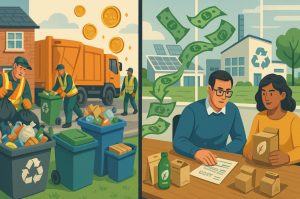Table of Contents
ToggleIs England’s recycling system finally getting the overhaul it needs? Will taxpayers and startups benefit from these sweeping reforms? On 26 July 2025, Circular Economy Minister Mary Creagh announced a transformative £1.1 billion investment into local recycling services across England.
This injection of funds marks a major shift in how recycling will be managed nationwide, as businesses that produce packaging will now be made financially responsible for its disposal. The move aims to relieve pressure on councils, boost household recycling rates, and catalyse innovation in packaging design and green infrastructure.
Why Is the Government Changing the Way Recycling Is Funded?

Until now, the cost of collecting and processing packaging waste has been paid largely by local councils and, in turn, by taxpayers. However, under the Extended Producer Responsibility (EPR) for Packaging scheme, that responsibility shifts to the businesses producing the packaging materials in the first place.
This model ensures that those who contribute to waste generation also contribute to its solution.
The plan is part of the government’s broader Plan for Change, designed to support environmental responsibility and unlock regional growth.
By holding producers accountable for the end life of their products, the reforms encourage better packaging design, greater material recyclability, and ultimately, less waste heading to landfills and incinerators.
How Will the £1.1 Billion Be Used by Local Councils?
This funding provides councils with the means to upgrade and modernise their recycling infrastructure. It may be used to streamline waste collection services, invest in new recycling equipment, or enhance sorting and processing facilities.
An example is Veolia’s Integrated Waste Management Facility in Southwark, which already converts collected waste into reusable materials.
These changes are expected to reduce contamination rates, simplify household sorting systems, and improve the volume and quality of recyclables recovered.
Councils will also be monitored to ensure these funds are spent directly on improving packaging waste services, with the watchdog PackUK empowered to reduce future allocations if money is diverted elsewhere.
What Will Businesses Need to Do Under the New Rules?
Businesses using packaging will now pay fees that cover the full cost of its collection and recycling. These fees vary depending on how easy it is to recycle the materials used. The system is structured to reward environmentally responsible packaging choices and discourage wasteful, difficult-to-recycle formats.
| Type of Packaging | Expected Fee Level |
| Easily recyclable materials | Lower |
| Hard-to-recycle materials | Higher |
| Refillable or reusable items | Lowest or incentivised fees |
This creates a clear economic signal: reduce packaging, use more recyclable materials, and design for reuse to avoid higher compliance costs. It also places responsibility for waste where it can be most effectively managed at the point of production.
How Will This Affect the UK Economy and Green Jobs?

The EPR scheme is not just a recycling policy; it’s an economic catalyst. According to government and industry estimates, this packaging reform will support up to 25,000 new green jobs and stimulate £10 billion in private sector investment in new sorting, collection, and processing infrastructure.
As recycling services expand, there will be rising demand for engineers, data analysts, materials scientists, logistics experts, and environmental consultants.
For startups, particularly in the circular economy, this creates a significant opportunity to scale technologies that help businesses comply with EPR rules or deliver sustainable alternatives.
What Do Industry Leaders and Local Councils Think?
Government ministers, waste management companies, and local authorities have broadly welcomed the reforms. Minister Mary Creagh emphasised that this is part of ending Britain’s “throwaway society” and building a recycling-first culture.
Veolia UK, one of the country’s largest waste operators, called the scheme a necessary foundation for investing in domestic infrastructure and decarbonisation.
The Local Government Association recognised the benefit of shifting the cost burden away from councils, which have managed recycling services under financial strain for years.
Others, such as the Food and Drink Federation and the Environmental Services Association, acknowledged that while the EPR regime will increase compliance costs for businesses, it is a fair and overdue correction that will ultimately benefit consumers, councils, and the environment.
What Comes Next in the UK’s Packaging Reform Plan?
EPR for Packaging is just one part of the UK’s wider waste and recycling reform programme. Over the next few years, more changes are coming to improve consistency, accessibility, and efficiency.
| Initiative | Planned Start | Purpose |
| Simpler Recycling (Workplaces) | March 2025 | Standardised material collections in non-domestic settings |
| Simpler Recycling (Households) | March 2026 | Uniform household recycling systems across local councils |
| Deposit Return Scheme | 2027 | Cash incentives for returning drink bottles and cans |
| Circular Economy Strategy | Autumn 2025 | Sector-by-sector roadmaps to reduce material waste |
The Circular Economy Taskforce is also working closely with the government to create long-term roadmaps for industries to shift towards reusability, efficiency, and low-carbon material use.
What Does This Mean for UK Startups?

This is a pivotal moment for startups working on packaging innovation, recycling technology, and sustainability consultancy.
As producers look for cost-effective ways to comply with EPR and reduce fees, startups that offer eco-design services, packaging alternatives, or digital tracking for waste compliance are likely to see increased demand.
Moreover, startups developing smart recycling infrastructure, AI-driven material sorting, or community-level collection solutions can now position themselves as key partners for councils or private waste firms investing their share of the £1.1 billion.
With long-term investment flowing into the sector and legislation that rewards sustainable design, the UK’s circular economy is no longer just an environmental ambition it’s a startup opportunity.
FAQ
What is the Extended Producer Responsibility (EPR) for Packaging?
EPR makes packaging producers responsible for the full cost of collecting and recycling their packaging waste.
How much funding are councils in England receiving?
Councils will receive £1.1 billion in 2025 to upgrade local recycling services.
Will this reduce costs for taxpayers?
Yes, shifting recycling costs to producers aims to reduce the financial burden on local councils and taxpayers.
How will businesses be charged under EPR?
Fees will be higher for hard-to-recycle materials and lower for recyclable or reusable packaging.
What’s the goal of this reform?
To improve recycling rates, reduce landfill use, encourage better packaging design, and support a circular economy.




